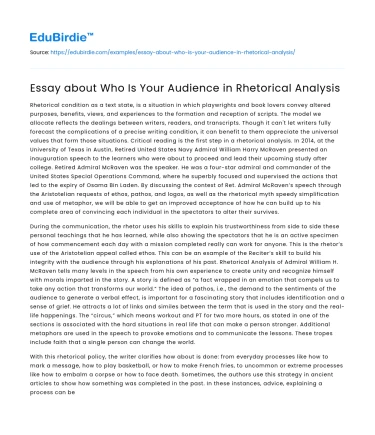Introduction
In the realm of rhetoric, identifying the audience is a fundamental aspect that significantly influences the effectiveness of communication. Rhetorical analysis, a critical tool in understanding how language and symbols create meaning, necessitates a discerning evaluation of the audience. The concept of audience in rhetorical analysis extends beyond mere recognition; it involves a nuanced understanding of the audience's values, beliefs, experiences, and expectations. This essay delves into the intricacies of audience consideration in rhetorical analysis, exploring its pivotal role in shaping discourse, the strategies employed to engage diverse audiences, and the challenges encountered in anticipating audience reactions. By examining these facets, we can appreciate how the audience not only consumes but also co-creates meaning within rhetorical contexts.
The Role of Audience in Shaping Discourse
The audience, in its capacity to shape discourse, plays a critical role in rhetorical analysis. Rhetorical strategies are often tailored to an audience's characteristics, which include demographics, cultural background, and prior knowledge. For instance, Aristotle's concept of ethos, logos, and pathos highlights the importance of aligning rhetorical appeals with audience expectations. Ethos, or the credibility of the speaker, is contingent on the audience's perception of the speaker's authority and trustworthiness. A study by Perloff (2017) emphasizes that speakers who adapt their ethos to match audience values are more persuasive. Furthermore, logos, the logical appeal, requires an understanding of the audience's intellectual capacity and predispositions. As evidenced in political discourse, arguments are often framed to resonate with the logical frameworks of specific voter bases. Pathos, the emotional appeal, hinges on the audience's emotional triggers, which vary widely across different cultural and social groups.
Save your time!
We can take care of your essay
- Proper editing and formatting
- Free revision, title page, and bibliography
- Flexible prices and money-back guarantee
Moreover, audience consideration is crucial in determining the medium and style of communication. Digital media, for instance, has transformed how audiences engage with rhetoric. A Pew Research Center report (2021) reveals that younger audiences prefer interactive and visual content, necessitating rhetorical approaches that leverage multimedia elements. This shift underscores the importance of understanding audience preferences in crafting effective messages. However, it is essential to acknowledge counter-arguments that suggest the fluidity of audience identity. As Bitzer (1968) argues, audiences are not passive recipients but active participants in the rhetorical situation. Therefore, understanding the audience requires recognizing their agency in interpreting and responding to messages, which adds complexity to rhetorical analysis.
Strategies for Engaging Diverse Audiences
Engaging diverse audiences necessitates strategic rhetorical approaches that account for varying backgrounds and perspectives. One effective strategy is audience segmentation, which involves dividing a broad audience into smaller, more homogeneous groups. This approach allows rhetoricians to tailor messages to specific segments, enhancing relevance and impact. For example, in advertising, companies often segment their audience based on factors such as age, gender, and income to craft targeted campaigns. The success of this strategy lies in its ability to speak directly to the interests and needs of different audience groups.
Another strategy is the use of inclusive language, which fosters connection and understanding across diverse audiences. Inclusive language avoids assumptions and stereotypes, promoting a sense of belonging and respect. In a study on political speeches, Lakoff (2004) found that inclusive language increased audience engagement and support. Additionally, rhetoricians may employ narrative techniques to bridge cultural and experiential gaps. Narratives offer relatable and compelling stories that resonate with audiences' lived experiences. This technique is particularly effective in social justice movements, where personal stories humanize abstract issues and mobilize support. However, critics argue that narrative approaches risk oversimplifying complex issues, potentially leading to misinterpretation.
Challenges in Anticipating Audience Reactions
Anticipating audience reactions presents significant challenges in rhetorical analysis. Audiences are dynamic and multifaceted, with varying interpretations influenced by personal, social, and cultural factors. This complexity makes it difficult for rhetoricians to predict how audiences will receive and interpret messages. Audience fragmentation, exacerbated by the proliferation of digital media, further complicates this task. In an era where information is abundant and accessible, audiences often self-select content that aligns with their pre-existing beliefs, creating echo chambers. As Sunstein (2018) notes, these echo chambers reinforce biases and limit exposure to diverse viewpoints, posing a challenge for rhetoricians seeking to reach broader audiences.
Moreover, the unpredictability of audience reactions is evident in the context of global communication, where cultural differences can lead to misinterpretation. For instance, gestures or phrases deemed acceptable in one culture may be offensive in another. This cultural variability necessitates a high level of cultural competence and adaptability from rhetoricians. Despite these challenges, some argue that unpredictability should not deter rhetorical efforts. Rather, it underscores the importance of continuous audience research and feedback to refine rhetorical strategies. By embracing audience diversity and unpredictability, rhetoricians can enhance the inclusivity and effectiveness of their communication.
Conclusion
In conclusion, understanding the audience is a cornerstone of effective rhetorical analysis. The audience's role in shaping discourse, the strategic engagement of diverse audiences, and the challenges of anticipating audience reactions are central to crafting meaningful and impactful messages. While the fluidity of audience identity and the unpredictability of reactions pose challenges, they also present opportunities for rhetoricians to innovate and adapt. By acknowledging the audience's agency and diversity, rhetoricians can foster dialogue that transcends cultural and social barriers. Ultimately, the audience is not merely a passive recipient of rhetoric but an active co-creator of meaning, underscoring the collaborative nature of communication. As digital media continues to evolve, the importance of audience consideration in rhetorical analysis will only grow, demanding ongoing exploration and adaptation.






 Stuck on your essay?
Stuck on your essay?

